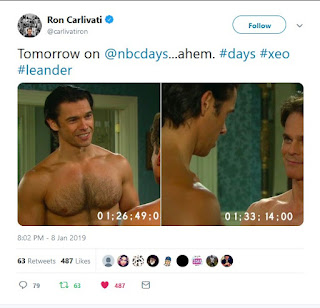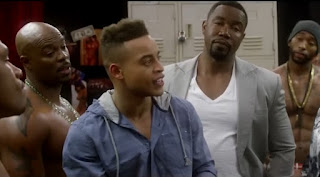Movie Review - Edge of Tomorrow
Tom Cruise is a leaner, meaner, sexier version of Bill Murray in Groundhog Day (1993), or he's what you get if you threw way more money at Source Code (2011), added beefed-up alien robots à la the Sentinels from The Matrix Reloaded (2003) and made it an allegory for World War II. The problem is that Doug Limon makes the same mistake as Duncan Jones. The movie should end a minute before it does. Neither have the courage of their convictions, unless the final scene for each was mandated from studio executives, or nervous producers.
Tom Cruise stars as Major William Cage, an officer in the U.S. Army who has never seen combat, a riff on Cruise's character in A Few Good Men (1992). Major Cage mainly acts as a mouthpiece, or a talking head, for cable news trying to spin the United Defense Force (UDF), a military group based in London that has new technology to fight an alien invasion and its hoard of robots.
When Cage meets the head of UDF, General Brigham, played by Brendan Gleeson, the General thinks it's a good idea to send Cage into the front lines with the new technology. Cage says no being that he's more of a pundit or an advertising executive than he is a soldier. He has no experience or field training.
The General doesn't care and sends Cage anyway. The General makes sure that Cage can't leave and that he is front and center for the "D-Day" like battle that the UDF is planning. It's no surprise that opening day for this film is June 6, marking the 70th anniversary of the Normandy landing in France in 1944, known as "D-Day." The battle waged by the UDF here also is at a beach in that European nation.
The new technology is basically battle armor that soldiers wear to enhance their strength and weaponry. The technology looks somewhere in between the contraption Matt Damon wore in Elysium (2013) and the suit Sigourney Weaver wore at the end of Aliens (1986). Cage has never been in one, but immediately he's thrown into it and is launched into the war zone.
A reference is made in dialogue to Full Metal Jacket (1967) because that's literally what this new technology is. It's a full metal jacket that the soldiers put on, but this film proceeds not unlike that Stanley Kubrick movie where Cage has to go through tough training or a harsh boot camp in order to prepare for a major combat. The difference is that we're not really given much of a chance to learn about the soldiers who surround Cage and fight with him, except the snippets that Cage rattles off about each in the same Groundhog Day joke of the protagonist's seeming omniscience about the so-called "J-Squad."
I did, however, notice Franz Drameh, a young black British actor who became notable due to his starring role in Attack the Block (2011). Here, Drameh plays Ford. His character stands out among the J-Squad.
Cage and J-Squad are dropped into battle. All of whom die, but Cage realizes that every time he dies, he's thrown back in time one day to re-live the same 24 hours all over again. Screenwriters Christopher McQuarrie (The Usual Suspects), Jez Butterworth and John-Henry Butterworth milk enough pleasure and pathos as they can within this premise. Editor James Herbert cuts and moves the film along at a very great and entertaining pace, never at all really slowing down.
This matches with Doug Limon (The Bourne Identity) and his direction. Limon's action here is dirty and scrappy. It's wild and kinetic. The scenes are noticeably done handheld, putting us down on the ground with the soldiers. It's not noticeably distracting, but like with the 3D, it helps to immerse us in the frenetic nature of the whole affair.
Of course, it gets to a point where the entire thing feels like a video game. Tom Cruise's character literally becomes a character out of Halo, or even Super Mario Bros. Every time he dies, it's just a matter of popping another quarter into the arcade machine and trying the level all over again. Given the premise, I can't see how Limon could have avoided this. It would be like criticizing this film for being repetitive.
My only true gripe is the ending and that's the final scene and shot. I have the same problem here as I did with Source Code. The scene right before the final scene would have been the perfect ending, but instead the movie tacks on an extra scene to give it a more pleasant conclusion. That happy ending may or may not be a full happy ending, which would have been not totally but more in line with the novel by Hiroshi Sakurazaki on which this film is based.
The feeling though in that final scene seems to be that everything is okay, but given the rules observed, the ending's happiness might just be a facade. It's unclear.
Four Stars out of Five.
Rated PG-13 for sci-fi action and violence, language and brief suggestive material.
Running Time: 1 hr. and 53 mins.
Tom Cruise stars as Major William Cage, an officer in the U.S. Army who has never seen combat, a riff on Cruise's character in A Few Good Men (1992). Major Cage mainly acts as a mouthpiece, or a talking head, for cable news trying to spin the United Defense Force (UDF), a military group based in London that has new technology to fight an alien invasion and its hoard of robots.
When Cage meets the head of UDF, General Brigham, played by Brendan Gleeson, the General thinks it's a good idea to send Cage into the front lines with the new technology. Cage says no being that he's more of a pundit or an advertising executive than he is a soldier. He has no experience or field training.
The General doesn't care and sends Cage anyway. The General makes sure that Cage can't leave and that he is front and center for the "D-Day" like battle that the UDF is planning. It's no surprise that opening day for this film is June 6, marking the 70th anniversary of the Normandy landing in France in 1944, known as "D-Day." The battle waged by the UDF here also is at a beach in that European nation.
The new technology is basically battle armor that soldiers wear to enhance their strength and weaponry. The technology looks somewhere in between the contraption Matt Damon wore in Elysium (2013) and the suit Sigourney Weaver wore at the end of Aliens (1986). Cage has never been in one, but immediately he's thrown into it and is launched into the war zone.
A reference is made in dialogue to Full Metal Jacket (1967) because that's literally what this new technology is. It's a full metal jacket that the soldiers put on, but this film proceeds not unlike that Stanley Kubrick movie where Cage has to go through tough training or a harsh boot camp in order to prepare for a major combat. The difference is that we're not really given much of a chance to learn about the soldiers who surround Cage and fight with him, except the snippets that Cage rattles off about each in the same Groundhog Day joke of the protagonist's seeming omniscience about the so-called "J-Squad."
I did, however, notice Franz Drameh, a young black British actor who became notable due to his starring role in Attack the Block (2011). Here, Drameh plays Ford. His character stands out among the J-Squad.
Cage and J-Squad are dropped into battle. All of whom die, but Cage realizes that every time he dies, he's thrown back in time one day to re-live the same 24 hours all over again. Screenwriters Christopher McQuarrie (The Usual Suspects), Jez Butterworth and John-Henry Butterworth milk enough pleasure and pathos as they can within this premise. Editor James Herbert cuts and moves the film along at a very great and entertaining pace, never at all really slowing down.
This matches with Doug Limon (The Bourne Identity) and his direction. Limon's action here is dirty and scrappy. It's wild and kinetic. The scenes are noticeably done handheld, putting us down on the ground with the soldiers. It's not noticeably distracting, but like with the 3D, it helps to immerse us in the frenetic nature of the whole affair.
Of course, it gets to a point where the entire thing feels like a video game. Tom Cruise's character literally becomes a character out of Halo, or even Super Mario Bros. Every time he dies, it's just a matter of popping another quarter into the arcade machine and trying the level all over again. Given the premise, I can't see how Limon could have avoided this. It would be like criticizing this film for being repetitive.
My only true gripe is the ending and that's the final scene and shot. I have the same problem here as I did with Source Code. The scene right before the final scene would have been the perfect ending, but instead the movie tacks on an extra scene to give it a more pleasant conclusion. That happy ending may or may not be a full happy ending, which would have been not totally but more in line with the novel by Hiroshi Sakurazaki on which this film is based.
The feeling though in that final scene seems to be that everything is okay, but given the rules observed, the ending's happiness might just be a facade. It's unclear.
Four Stars out of Five.
Rated PG-13 for sci-fi action and violence, language and brief suggestive material.
Running Time: 1 hr. and 53 mins.











Comments
Post a Comment